The week ahead in Parliament
- Published
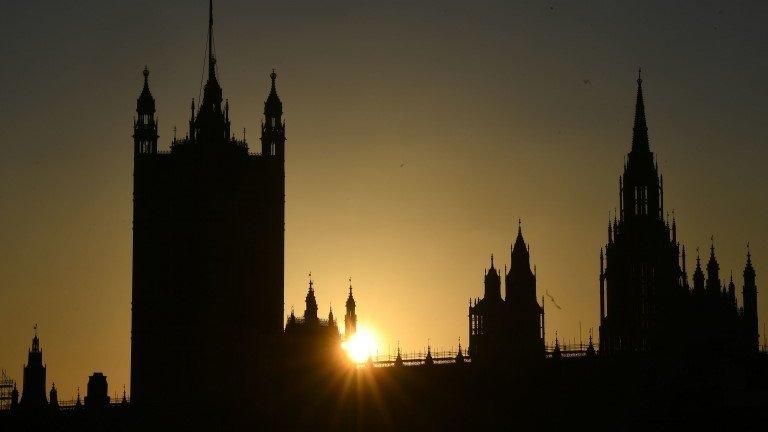
It's Budget week - in fact, the first Budget week for more than a year.
The last time a chancellor posed with his red box on the steps of 11 Downing Street, for the traditional photo-op, was when Philip Hammond summoned up a grin back on 29 October 2018.
Since then, a combination of a lack of a majority and a general election have delayed the next exciting episode of UK fiscal policy - resulting in the longest gap between budgets since the 19th Century.
The simple fact of that interval will mean there is a lot in the package Rishi Sunak will lay before MPs, particularly the implementation of some promised changes to National Insurance thresholds, targeted at lower income earners.
And there is chatter about a big new policy initiative on skills.
But this will be a Budget delivered under the shadow of the cornonavirus and the economic uncertainty which has caused stock markets and US interest rates to drop, which suggests the new chancellor may have to keep at least some of his powder dry.
So, while he may be able to set out the spending envelope for the coming year, the announcement of big ticket infrastructure investments might, prudently, be delayed until the effect of any epidemic is clearer.
Even the usual blizzard of economic forecasts that come with a Budget are a little devalued, because they will have been compiled before the virus became a factor - so what are expected to be quite anaemic growth predictions (UK growth at maybe 0.8% according to the last Bank of England forecast) may be discounted even further by the commentators.
But this will not be the only big parliamentary economic event of the year - there's a major spending review in progress, which could provide the opportunity for big positive announcements later on and, for those who remember the halcyon days of Denis Healey, there's always the possibility of a mini-budget.
Beyond that, this will be an important test for Mr Sunak. His quantum leap up the political pecking order, from new MP in 2015 to the second most important job in the government in under five years, means he is pretty untested as a cabinet-level parliamentarian - and he will be expected to display both substance and style in what are clearly going to be rather awkward circumstances.
But it's also worth remembering he was Boris Johnson's stand-in for one of the TV debates in the election, so his colleagues clearly believe he can handle high-profile challenges.
Further coronavirus meetings
Behind the scenes on Monday, the House of Commons Commission - the administrative arm of the House - will be meeting their Lords opposite numbers - with Parliament's response to the coronavirus on the agenda.
There's a swirling internal debate about banning tourists and school parties from visiting as an initial precaution - with the thought that if the virus really takes hold, the work of Parliament could be limited to emergency business, although talk of Parliament being suspended until September is being played down by the Speaker and Lord Speaker.
In practice, any decision on that would come from the government, not the parliamentary authorities. There would have to be cross-party agreement, allowing laws to be passed by a quorum of MPs - the legal minimum is 40 MPs, plus the speaker and deputy, but it's more likely there would be 100 of the 650 MPs present at Westminster.
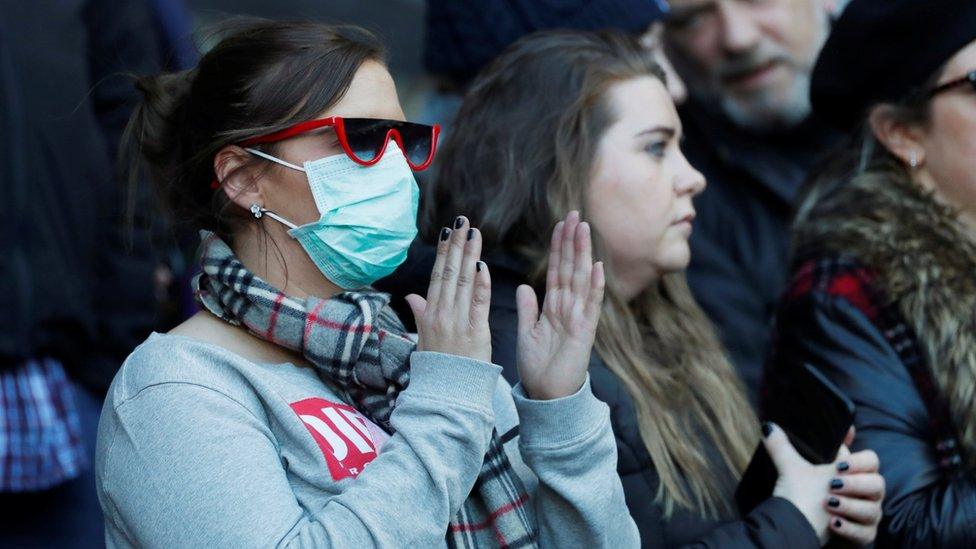
Coronavirus is likely to dominate in Westminster this week
The commission will also be meeting to look at the issues around the plan to move Parliament out of its Victorian home for the multi-billion pound Restoration and Renewal project (R&R for short).
This is happening amidst rising chatter of ditching the whole scheme in favour of a patch and mend approach, which would keep the parliamentarians in situ while different sections of the building were closed off - although many others believe this would be impractical.
The Northern Estate Project is the vehicle for the attack. This is the scheme to upgrade parliamentary offices across the road from the palace of Westminster and to rebuild Richmond House, the old Department of Health HQ, to house a temporary Commons chamber and provide more office space.
If that is halted then MPs will not be able to move out and the whole R&R project will be derailed.
Here's my rundown of the rest of the week ahead.
Monday 9 March
The Commons week begins (14:30 GMT) with questions to the Work and Pensions Secretary Therese Coffey and her team.
That may well be followed by some post-weekend ministerial statements and urgent questions.
Then the Lib Dem Wera Hobhouse will present a bill to make misogyny an aggravating factor in criminal sentencing, and the Conservative Philip Hollobone will present a rival bill to make misogyny and misandry - dislike of, contempt for, or ingrained prejudice against the male sex - aggravating factors.
Neither bill will be debated, but it's clear some Conservative MPs at least are reacting against the stream of presentation bills put down by Lib Dem women.
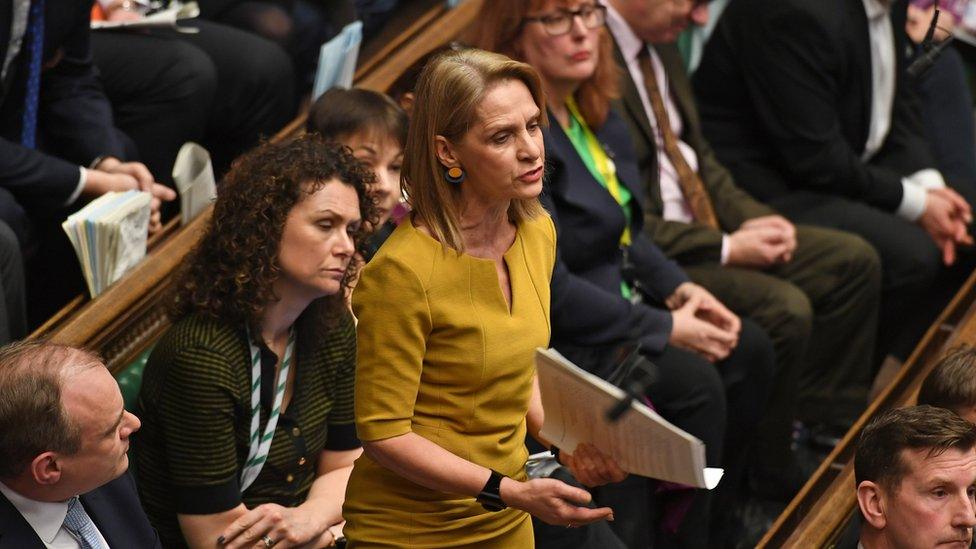
Lib Dem Wera Hobhouse will present a bill to the Commons
Next is the second reading of the Birmingham Commonwealth Games Bill, which enacts the kind of necessary temporary measures seen around previous major sporting events. It covers matters like unauthorised tickets sales, commercial rights and transport around games locations.
In Westminster Hall (16:30) there's the first Petitions Committee debate of the new Parliament on an e-petition calling for the government to provide 15 hours free childcare to working parents for children over nine-months-old, which attracted 146,397 signatures.
In the Lords (14:30), questions to ministers cover the gender pay gap, Sport England's "This Girl Can" campaign and ensuring the government will have "the most ambitious environmental programme of any country on Earth" in time for COP26 - as promised in the 2019 Conservative Party manifesto.
Then peers turn to their third day of committee stage scrutiny of the Fisheries Bill.
Tuesday 10 March
The Commons opens (11:30) with an hour of health and social care questions - which will certainly include the latest coronavirus update. Conservative Gareth Johnson has a Ten Minute Rule Bill to allow the courts to ban disruptive passengers from flying.
Then MPs turn to the report and third reading debate on the Telecommunications Infrastructure (Leasehold Property) Bill - and there may well be a significant backbench Conservative rebellion on what had seemed a pretty humdrum measure to allow 5G communications infrastructure to be installed in buildings with uncooperative owners.
Conservative backbenchers, headed by the former party leader, Sir Iain Duncan Smith, have put down an amendment to restrict the ability of "high risk vendors" to provide this vital new infrastructure - in particular the Chinese telecoms firm Huawei, which they argue is controlled by the Chinese state.
This is serious because it is a direct policy challenge to the government.
It is not a done deal that this amendment will be selected for debate, despite a long list of heavyweight backers, including former cabinet ministers Damian Green, David Davis and Owen Paterson, Foreign Affairs Select Committee chair Tom Tugendhat, and the lurking presence in support of 1922 Committee chair Sir Graham Brady.
And it's worth pointing out that Labour, in the form of shadow minister Chi Onwurah, proposed a not dissimilar amendment at committee stage, where DCMS minister Matt Warman promised there would be new controls on high-risk vendors, who would be excluded from all safety-related and safety-critical networks in critical national infrastructure, excluded from the security-critical core network functions and limited to a minority presence of up to 35% in the other parts of the network, as well as being subject to tight restrictions, including exclusions from sensitive locations.
He also said the government's decision on high-risk vendors was evidence-based and taken on a comprehensive security assessment, as well as noting the realities of the telecoms market - which I think means Huawei is the only credible supplier in the government's view.
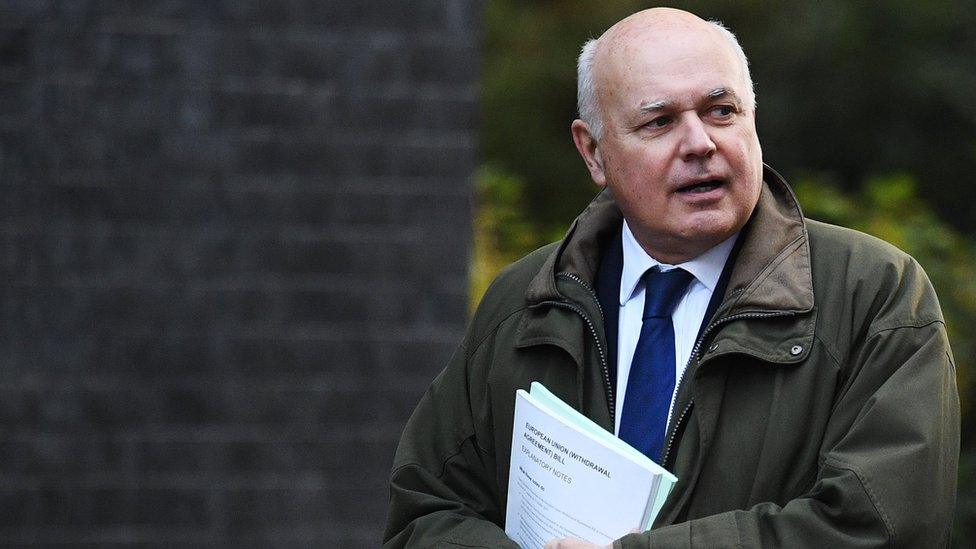
Sir Iain Duncan Smith is leading the rebellion against the government's Huawei decision
The debate is followed by the first Backbench Business Committee debate of the new Parliament, on lesbian, bisexual and trans women's health inequalities, led by the Conservative ex-minister Crispin Blunt, and the SNP's Hannah Bardell.
More and more select committee inquiries are under way: the Public Administration and Constitutional Affairs Committee will take evidence (09:30) from Britain's top civil servant, the Cabinet Secretary Sir Mark Sedwill, and Sir John Manzoni, Civil Service chief executive and permanent secretary to the Cabinet Office.
Following the spectacular resignation of the permanent secretary to the Home Office, Sir Philip Rutnam, and his allegation of constructive dismissal and bullying against the Home Secretary, Priti Patel, the committee will examine the working relationships between government ministers and officials, and also look at the appointment, terms of employment and accountability of special advisers. Bring popcorn.
Elsewhere, the Business, Energy and Industrial Strategy Committee holds the first hearing (10:30) in its inquiry on issues emerging from the Horizon IT Court cases, looking at the impact on sub-postmasters and its effect on the future viability of the Post Office, and examining the lessons the government and Post Office Ltd have learned from a scandal which saw hundreds of sub-postmasters accused and, in some cases, wrongly convicted of fraud.
In the Lords (14:30), questions have an International Women's Day flavour, covering the financial sustainability of women's refuges, equal pay legislation and gender equality education, before peers move on to their annual International Women's Day debate.
Wednesday 11 March
A big day in the Commons opens (11:30) with half an hour of Women and Equalities questions, with International Trade Secretary Liz Truss answering for the government. Then comes Prime Minister's Questions, as an appetiser to the Chancellor of the Exchequer, Rishi Sunak, and the Budget.
A series of themed days of debate on the Budget will follow - although there will be a brief interlude between PMQs and the Budget, in which Lib Dem Sarah Olney will present a bill to ban anti-abortion protests within 150 meters of abortion clinics (but this will be a very brief parliamentary ritual, without debate).
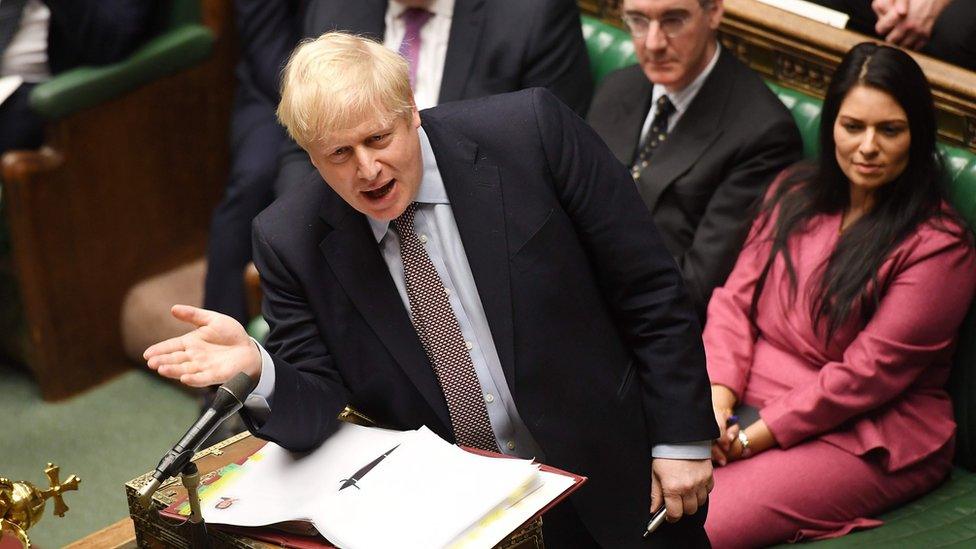
Boris Johnson will be back at the dispatch box for PMQs
My pick of the day's Westminster Hall debates is the one on the mental health of veterans (11:00).
Lib Dem Jamie Stone has a private members bill to ring fence a section of the NHS budget for the care of military veterans and will ask the government to provide debating time to ensure it makes it into law. He will also highlight the disturbing rise in veteran suicides and argue that the country owes veterans lifelong support.
In the Lords (15:00), questions to ministers cover the economic crisis and food emergency in Zimbabwe, gender segregation in publicly funded apprenticeships, and the increase in the number of people with dementia admitted to A&E departments.
Then peers move on to their fourth day of committee stage scrutiny of the Fisheries Bill.
Thursday 12 March
The Commons opens (09:30) with Transport Questions, followed by the weekly Commons Business Statement from the Leader of the House, Jacob Rees-Mogg. Look out for notice of any coronavirus-related emergency legislation.
After that, the Budget debate continues - but we won't know the themes allotted to each day of the debate until the Budget is delivered.
My committee corridor pick is the Digital, Culture, Media and Sport hearing (09:45) on the work of the BBC, with the new committee chair, Julian Knight leading the questioning of the BBC Director General, Lord Tony Hall, and BBC Chairman Sir David Clementi.
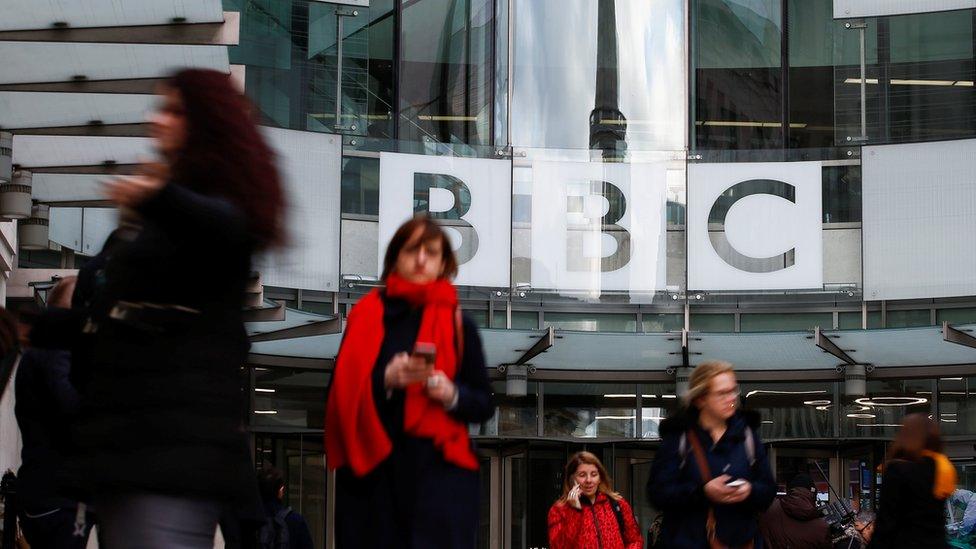
BBC bosses will be questioned on Thursday
In the Lords (11:00), questions range from the results of the Republic of Ireland general election and the eradication of Japanese Knotweed to arrangements for the climate change conference COP26.
The main debates are on subjects raised by backbench peers - on the case for the government to use wellbeing as a key indicator of national performance when setting budgets, and on investing in, and embracing, the green economy.
Friday 13 March
It's the Commons' first Private Members Bill Friday of the new Parliament (from 09:30) starting with the Second Reading of the Education (Guidance about Costs of School Uniforms) Bill from Labour's Mike Amesbury.
He aims to make school uniforms affordable by changing the law so schools and governing bodies must make affordability a key consideration when setting their uniform policies.
The idea is to stop large proportions of the uniforms from being branded items or only exclusively available from school shops or at high-priced retailers.
If passed, the bill would allow parents to buy uniforms from supermarkets and other cheaper suppliers, and then school identities could be sewn on later.
Then comes the Second Reading of the Conservative Bim Afolami's British Library Board (Power to Borrow) Bill.
At the moment the British Library is banned by law from borrowing money, but removing the ban would allow it to strengthen its traditional offering by borrowing to extend the advice and guidance services it already provides to people starting up small businesses.
This is mostly done in London and a couple of big cities at the moment, and the aim of the bill is to allow those services to be extended to more of the country
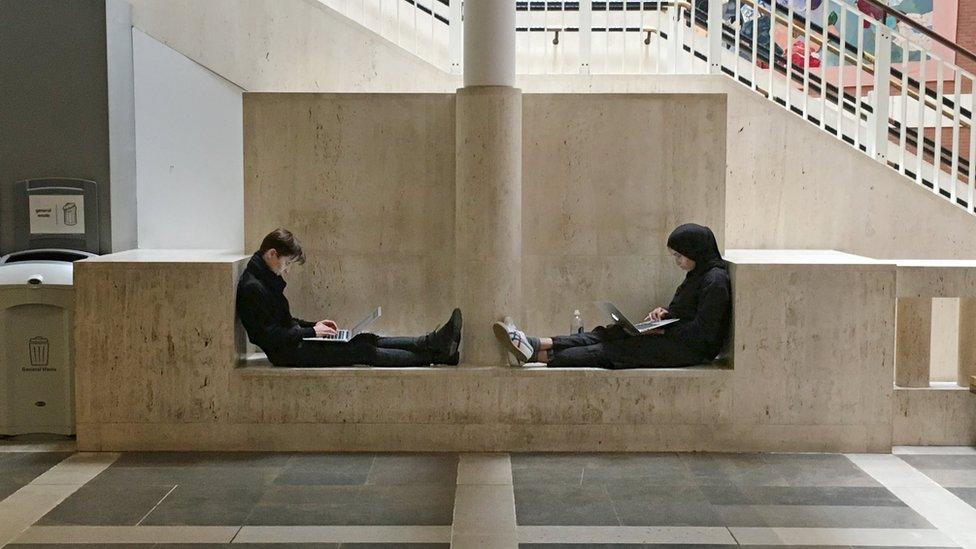
The British Library will be a hot topic on Friday
Third on the agenda, and therefore unlikely to have all that much time for debate, is the Second Reading of the Education and Training (Welfare of Children) Bill, proposed by Labour's Mary Kelly Foy.
This seeks to put a statutory duty on all providers of post-16 education and training to safeguard and promote the welfare of children.
At the moment, this duty falls on schools, further education colleges and sixth form colleges, but not on 16-19 academies or independent training providers, and the bill seeks to end that anomaly.
Next on the agenda - although it's unlikely MPs will have much, if any, time to debate them - comes a series of bills proposed by Conservative awkward squaddie, and frequent Friday flyer, Sir Christopher Chope, namely the Public Sector Exit Payments (Limitation) Bill, the Green Belt Protection Bill and the Bat Habitats Regulation Bill.
If he's lucky, he may get a few minutes to make the case for one of them.
There are also Private Members Bills in the Lords (10:00) - the Second Reading of Labour's Lord Grocott's umpteenth version of the House of Lords (Hereditary Peers) (Abolition of By-Elections) Bill should provide some entertainment, because the minister likely to be responding for the government is Lord True.
He is now at the Cabinet Office, but was previously one of the peers who had attempted to talk out previous incarnations of this measure.
The bill would have the effect of allowing the hereditary component of the House to wither away, by blocking the process by which hereditary peers who die or retire are replaced. Another popcorn moment.
Next comes the second reading of the Big Issue founder Lord Bird's Wellbeing of Future Generations Bill, which aims to create a "future generations test" for all new policy changes.
The idea is to revolutionise how laws and policies are made by requiring them to enhance the environmental, economic, social and cultural well-being of current and future generations, making life better for all people in the UK.
It mirrors the Welsh Assembly's Well-being of Future Generations (Wales) Act 2015, which had at its heart a duty on all public bodies, including Welsh ministers, to act in accordance with a sustainable development principle.
